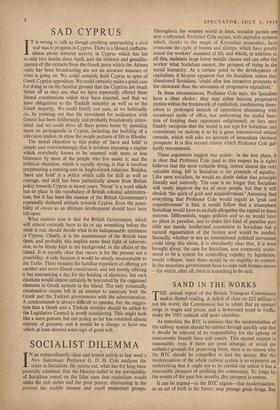SOCIALIST DILEMMA
• e
IN an extraordinarily clear and honest article in last week's New Statesman, Professor G. D. H. Cole analyses the crisis in Socialism. He points out, what has for long been generally admitted, that the Marxist belief in the inevitability of Socialism rested on the false view that capitalism would make the rich richer and the poor poorer, eliminating in the process the middle income and small propertied groups. Throughout the western world at least, socialist parties are now confronted, Professor Cole argues, with capitalist systems which, thanks to the magic of Keynesian economics, have overcome the cycle of booms and slumps, which have greatly raised the workers' standard of life and which, in addition to all this, maintain large lower middle classes and can offer the worker what Socialism cannot, the prospect of rising in the social hierarchy. At a certain point in the development of capitalism, it became apparent that the Socialists, unless they abandoned Socialism, 'could offer less attractive prospects to the electorate than the advocates of progressive capitalism.'
In these circumstances, Professor Cole says, the Spcialists have a clear choice : they may either become progressive parties within the framework of capitalism, condemning them- selves to prolonged periods of opposition alternating with occasional spells of office, but performing the useful func- tion of keeping their opponents enlightened; or they may frankly recognise that the world is not ripe for Socialism and concentrate on making it so by a great international ethical crusade, which will take no account of immediate electoral prospects. It is this second course which Professor Cole gal- lantly recommends.
These arguments suggest two points : in the first place, it is clear that Professor Cole (and in this respect he is right) believes that the most valuable thing, indeed almost the only valuable thing, left in Socialism is the principle of equality. Like most socialists, he would no doubt define that principle literally and narrowly. The case is no longer that Socialism will vastly improve the lot of most people, but that it will abolish 'the spirit of grab and acquisitiveness.' Assuming that everything that Professor Cole would regard as 'grab and acquisitiveness' is bad, it would follow that a triumphant Socialism would have to exclude altogether the appeal to these motives. Differentials, wages policies and so on would have no place in paradise, and to make this kind of paradise pos- sible not merely intellectual conversion to Socialism but a natural regeneration of the human soul would be needed. Secondly, whether or not an international political movement could bring this about, it is abundantly clear that, if it were brought about, the case for Socialism, now commonly under- stood to be a system for controlling cupidity by legislation, would collapse, since there would be no cupidity to control. In the meantime governments have to cope with human nature —for which, after all, there is something to be said.














































 Previous page
Previous page